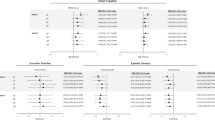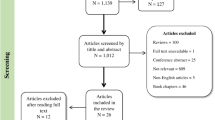Abstract
The relation between zinc status and cognitive function was examined in a cross-sectional study in the Sidama area of Southern Ethiopia. Pregnant women >24 weeks of gestation from three adjacent rural villages volunteered to participate. Mean (s.d.) plasma zinc of 99 women was 6.97 (1.07) μmol/l (below the cutoff of 7.6 μmol/l indicative of zinc deficiency at this stage of gestation). The Raven's Coloured Progressive Matrices (CPM) test was administered individually. Scores for the Raven's scale A, which is the simplest scale, ranged from 4 to 10 of a possible 12. Women with plasma zinc <7.6 μmol/l had significantly lower Raven's CPM scale A scores than women with plasma zinc concentrations >7.6 μmol/l. Plasma zinc and maternal age and education predicted 17% of the variation in Raven's CPM scale A scores. We conclude that zinc deficiency is a major factor affecting cognition in these pregnant women.
This is a preview of subscription content, access via your institution
Access options
Subscribe to this journal
Receive 12 print issues and online access
$259.00 per year
only $21.58 per issue
Buy this article
- Purchase on Springer Link
- Instant access to full article PDF
Prices may be subject to local taxes which are calculated during checkout

Similar content being viewed by others
References
Abebe Y, Bogale A, Hambidge KM, Stoecker BJ, Arbide I, Teshome A et al. (2007). Inadequate intakes of dietary zinc among pregnant women from subsistence households in Sidama, Southern Ethiopia. Public Health Nutr 11, 379–386.
Beard JL, Hendricks MK, Perez EM, Murray-Kolb LE, Berg A, Vernon-Feagans L et al. (2005). Maternal iron deficiency anemia affects postpartum emotions and cognition. J Nutr 135, 267–272.
Bhargava A, Fox-Kean M (2003). The effects of maternal education versus cognitive test scores on child nutrition in Kenya. Econ Hum Biol 1, 309–319.
Bhatnagar S, Taneja S (2001). Zinc and cognitive development. British J Nutr 85, S139–S145.
Blair C (2006). How similar are fluid cognition and general intelligence? A developmental neuroscience perspective on fluid cognition as an aspect of human cognitive ability. Behav Brain Sci 29, 109–125.
Hambidge KM, Abebe Y, Gibson RS, Westcott JE, Miller LV, Lei S et al. (2006). Zinc absorption during late pregnancy in rural Southern Ethiopia. Am J Clin Nutr 84, 1102–1106.
Hotz C, Brown KH, International Zinc Nutrition Consultative Group (IZiNCG) (2004). Assessment of the risk of zinc deficiency in populations and options for its control. Food Nutr Bull 25, S91–S202.
Neumann CG, Murphy SP, Gewa C, Grillenberger M, Bwibo NO (2007). Meat supplementation improves growth, cognitive, and behavioral outcomes in Kenyan children. J Nutr 137, 1119–1123.
Raven JC (1984). Manual for the Coloured Progressive Matrices (Revised). NFER-Nelson: Windsor, UK.
Sandiford P, Cassel J, Sanchez G, Coldham C (1997). Does intelligence account for the link between maternal literacy and child survival? Soc Sci Med 45, 1231–1239.
Takeda A (2001). Zinc homeostasis and functions of zinc in the brain. Biometals 14, 343–351.
Zimmermann MB, Connolly K, Bozo M, Bridson J, Rohner F, Grimci L (2006). Iodine supplementation improves cognition in iodine-deficient schoolchildren in Albania: a randomized, controlled, double-blind study. Am J Clin Nutr 83, 108–114.
Acknowledgements
We acknowledge assistance of Sidama and Bushelo Health Center community workers. We thank Elsa and Mebrat, Carolyn Hambidge and study participants. Research support from Fogarty International Center (R21_TW006729) and Office of Dietary Supplements, NIH, and from GCRC M01 RR00069 and NIH MRDDR Center Grant (P30 HD004024) is also acknowledged.
Author information
Authors and Affiliations
Corresponding author
Rights and permissions
About this article
Cite this article
Stoecker, B., Abebe, Y., Hubbs-Tait, L. et al. Zinc status and cognitive function of pregnant women in Southern Ethiopia. Eur J Clin Nutr 63, 916–918 (2009). https://doi.org/10.1038/ejcn.2008.77
Received:
Revised:
Accepted:
Published:
Issue Date:
DOI: https://doi.org/10.1038/ejcn.2008.77
Keywords
This article is cited by
-
Identification of genomic regions conferring rust resistance and enhanced mineral accumulation in a HarvestPlus Association Mapping Panel of wheat
Theoretical and Applied Genetics (2022)
-
Prevalence and associated factors of zinc deficiency among pregnant women and children in Ethiopia: a systematic review and meta-analysis
BMC Public Health (2019)
-
Genetic dissection of grain zinc concentration in spring wheat for mainstreaming biofortification in CIMMYT wheat breeding
Scientific Reports (2018)
-
Prevalence of zinc deficiency and its association with dietary, serum albumin and intestinal parasitic infection among pregnant women attending antenatal care at the University of Gondar Hospital, Gondar, Northwest Ethiopia
BMC Nutrition (2015)
-
Zinc intake, status and indices of cognitive function in adults and children: a systematic review and meta-analysis
European Journal of Clinical Nutrition (2015)



